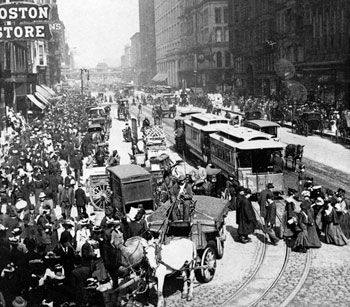Deerfield's Progressive Impulse
Well-made Baskets for the dutiful consumer
'The Century of Ugliness'
A 1910 article from The Craftsman magazine asked readers to "picture the consternation of an imaginative boy transplanted by some nameless magic from a New England farmhouse of a hundred years ago to the midrush of our present-day life!....We can picture him whirled from one point of interest to another, smothered and deafened in the subway, jostled and buffeted by the rush-hour crowds, shouted at in bullying tones by guards and conductors, and sent scurrying for safety by the insolent hooting of automobile horns, until he wonders whether he is a stray dog or a human being."1 After close to a century of ever-rapidly-increasing industrialization and urbanization, reform-minded proponents of the Arts and Crafts movement voiced concern about what America had become on "our broad road to civilization, somewhere between the colonial days and our machine days," as Deerfield's Madeline Yale Wynne described it.2 Craftsman contributor Ernest Crosby dubbed the 1800s 'The Century of Ugliness,' and warned that "high ideals and resolute action," would be needed to prevent "the same epitaph," being "written over the Twentieth."3
- Carman Robert, "Are We Becoming 'Civilized' too Rapidly," The Craftsman Vol. XVII January 1910 No. 4, 357-58.
- Madeline Yale Wynne, "The Influence of Arts & Crafts," Good Housekeeping October 1903, 327-28.
- Ernest Crosby, "The Century of Ugliness," The Craftsman July 1904, 409-410.
 In Their Words
In Their Words

© Collection of the Library of Congress
One of the busiest streets in the world--State Street, Chicago
Underwood and Underwood, Stereograph Card, c. 1903.






















